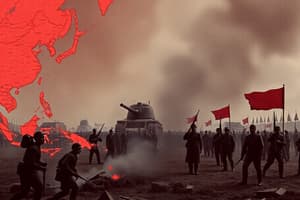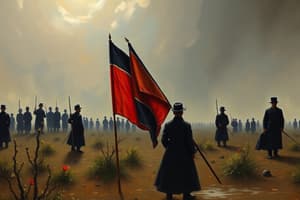Podcast
Questions and Answers
What was a major outcome of Archduke Ferdinand's assassination?
What was a major outcome of Archduke Ferdinand's assassination?
- Countries were drawn into war due to existing alliances. (correct)
- Nationalist movements ceased in various countries.
- It led to the immediate signing of peace treaties.
- It caused a widespread disarmament in Europe.
Which countries made up the Triple Entente during World War I?
Which countries made up the Triple Entente during World War I?
- Austria-Hungary, Germany, and Italy
- Russia, Great Britain, and France (correct)
- Germany, Turkey, and Serbia
- France, Italy, and Belgium
How did nationalism contribute to the tensions leading to World War I?
How did nationalism contribute to the tensions leading to World War I?
- It aligned national borders with cultural borders, promoting unity.
- It encouraged competition and distrust among nations. (correct)
- It fostered peace agreements between nations.
- It led to disarmament and reduced military spending.
What describes the phenomenon where countries significantly increased their military capacities in the late 19th and early 20th centuries?
What describes the phenomenon where countries significantly increased their military capacities in the late 19th and early 20th centuries?
Which ideology fueled the belief in the necessity of imperialism during the 19th century?
Which ideology fueled the belief in the necessity of imperialism during the 19th century?
What was one impact of the Berlin Conference on European powers and Africa?
What was one impact of the Berlin Conference on European powers and Africa?
What did an arms race in the late 1800s and early 1900s lead to among European nations?
What did an arms race in the late 1800s and early 1900s lead to among European nations?
What was the primary event that ignited World War I?
What was the primary event that ignited World War I?
Which of the following is NOT considered a long-term cause of World War I?
Which of the following is NOT considered a long-term cause of World War I?
Which country declared war on Serbia first, leading to the escalation of World War I?
Which country declared war on Serbia first, leading to the escalation of World War I?
How many soldiers and civilians died as a result of World War I?
How many soldiers and civilians died as a result of World War I?
What was the political situation in Europe immediately after the assassination of Archduke Ferdinand?
What was the political situation in Europe immediately after the assassination of Archduke Ferdinand?
Which area of Europe was known for its significance and instability due to diverse national interests before World War I?
Which area of Europe was known for its significance and instability due to diverse national interests before World War I?
Which of the following statements accurately describes the alliances during the buildup to World War I?
Which of the following statements accurately describes the alliances during the buildup to World War I?
What was one outcome of Napoleon's conquests in relation to European national boundaries?
What was one outcome of Napoleon's conquests in relation to European national boundaries?
Flashcards
Alliances in WWI
Alliances in WWI
Agreements between governments to protect military, political, or economic interests. These agreements pulled countries into war.
Triple Entente
Triple Entente
An alliance including Russia, Great Britain, and France.
Triple Alliance
Triple Alliance
An alliance consisting of Austria-Hungary, Germany, and Italy.
Nationalism
Nationalism
Signup and view all the flashcards
Militarism
Militarism
Signup and view all the flashcards
Imperialism
Imperialism
Signup and view all the flashcards
Scramble for Africa
Scramble for Africa
Signup and view all the flashcards
Spark of WWI
Spark of WWI
Signup and view all the flashcards
WWI's Long-Term Causes
WWI's Long-Term Causes
Signup and view all the flashcards
Balkan Region
Balkan Region
Signup and view all the flashcards
Allied Powers
Allied Powers
Signup and view all the flashcards
Assassination Impact
Assassination Impact
Signup and view all the flashcards
Central Powers
Central Powers
Signup and view all the flashcards
Alliances in Early 1900s
Alliances in Early 1900s
Signup and view all the flashcards
Study Notes
World War I: Causes and Spark
- World War I, known as the Great War or "the war to end all wars," resulted in over 21 million deaths of soldiers and civilians.
- Historians identify four key long-term causes: alliances, nationalism, militarism, and imperialism.
Alliances
- Alliances were agreements between countries to protect shared interests, military, political, or economic.
- These agreements created complex relationships in Europe and Asia.
- The main alliance groups were the Triple Entente (Russia, Britain, France) and the Triple Alliance (Austria-Hungary, Germany, Italy).
- The assassination of Archduke Ferdinand triggered existing alliances, drawing countries into the conflict.
- Countries were obligated to support allies based on these agreements.
- The pre-existing alliance systems rapidly escalated the conflict after the assassination of Archduke Ferdinand.
Nationalism
- Nationalism, or strong pride in one's culture and beliefs, grew in Europe, particularly after the unification of Germany and Italy.
- Nationalism can foster competition, animosity, and distrust between nations.
- The desire for independence and autonomy by ethnic groups in the Balkans also played a role.
Militarism
- Militarism is the build-up of a country’s military by investing in soldiers and weapons to increase military power.
- Military spending and troop numbers increased tensions between countries in a cycle of escalation and paranoia.
- An "arms race" fueled this escalation of military capacity.
- New weapons, like the machine gun, were developed during the period, contributing to the scale of conflict.
Imperialism
- Imperialism is the practice of dominating a country through military and bureaucratic power for economic or political gain.
- Imperial rivalries among European powers in Africa, Asia, and elsewhere increased tensions.
- Ideologies like Social Darwinism supported the expansion of empires.
- Competition for resources and colonies heightened disputes between nations.
Spark of World War I
- The assassination of Archduke Franz Ferdinand, heir to the Austro-Hungarian throne, and his wife Sophie triggered the war.
- This assassination occurred in the Balkans, an area with complex ethnic and nationalistic tensions.
- Austria-Hungary declared war on Serbia.
- This declaration sparked a chain reaction involving Russia, Germany, Britain and France.
- The pre-existing alliances and rivalries led to a full-scale war.
Studying That Suits You
Use AI to generate personalized quizzes and flashcards to suit your learning preferences.




